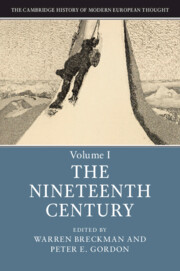Book contents
- The Cambridge History of Modern European Thought
- The Cambridge History of Modern European Thought
- The Cambridge History of Modern European Thought
- Copyright page
- Contents
- Contributors
- Preface
- Introduction
- 1 German Idealism: The Thought of Modernity
- 2 European Romanticism: Ambivalent Responses to the Sense of a New Epoch
- 3 History, Tradition, and Skepticism: The Patterns of Nineteenth-Century Theology
- 4 The Young Hegelians: Philosophy as Critical Praxis
- 5 Utilitarianism, God, and Moral Obligation from Locke to Sidgwick
- 6 Capital, Class, and Empire: Nineteenth-Century Political Economy and Its Imaginary
- 7 Positivism in European Intellectual, Political, and Religious Life
- 8 European Liberalism in the Nineteenth Century
- 9 European Socialism from the 1790s to the 1890s
- 10 Conservatism: The Utility of History and the Case against Rationalist Radicalism
- 11 The Woman Question: Liberal and Socialist Critiques of the Status of Women
- 12 Darwinism and Social Darwinism
- 13 Historicism from Ranke to Nietzsche
- 14 Philology, Language, and the Constitution of Meaning and Human Communities
- 15 Decadence and the “Second Modernity”
- 16 Nihilism, Pessimism, and the Conditions of Modernity
- 17 Civilization, Culture, and Race: Anthropology in the Nineteenth Century
- 18 The Varieties of Nationalist Thought
- 19 Ideas of Empire: Civilization, Race, and Global Hierarchy
- 20 Rethinking Revolution: Radicalism at the End of the Long Nineteenth Century
- Index
5 - Utilitarianism, God, and Moral Obligation from Locke to Sidgwick
Published online by Cambridge University Press: 15 August 2019
- The Cambridge History of Modern European Thought
- The Cambridge History of Modern European Thought
- The Cambridge History of Modern European Thought
- Copyright page
- Contents
- Contributors
- Preface
- Introduction
- 1 German Idealism: The Thought of Modernity
- 2 European Romanticism: Ambivalent Responses to the Sense of a New Epoch
- 3 History, Tradition, and Skepticism: The Patterns of Nineteenth-Century Theology
- 4 The Young Hegelians: Philosophy as Critical Praxis
- 5 Utilitarianism, God, and Moral Obligation from Locke to Sidgwick
- 6 Capital, Class, and Empire: Nineteenth-Century Political Economy and Its Imaginary
- 7 Positivism in European Intellectual, Political, and Religious Life
- 8 European Liberalism in the Nineteenth Century
- 9 European Socialism from the 1790s to the 1890s
- 10 Conservatism: The Utility of History and the Case against Rationalist Radicalism
- 11 The Woman Question: Liberal and Socialist Critiques of the Status of Women
- 12 Darwinism and Social Darwinism
- 13 Historicism from Ranke to Nietzsche
- 14 Philology, Language, and the Constitution of Meaning and Human Communities
- 15 Decadence and the “Second Modernity”
- 16 Nihilism, Pessimism, and the Conditions of Modernity
- 17 Civilization, Culture, and Race: Anthropology in the Nineteenth Century
- 18 The Varieties of Nationalist Thought
- 19 Ideas of Empire: Civilization, Race, and Global Hierarchy
- 20 Rethinking Revolution: Radicalism at the End of the Long Nineteenth Century
- Index
Summary
The standard account of the origin of utilitarianism is derived from Leslie Stephen, who argued that the doctrine developed from the rejection by John Locke (1632–1704) of innate ideas and his identification of good and evil with pleasure and pain, respectively. Stephen identified two strands of utilitarianism. One strand was ‘theological utilitarianism,’ propounded by a ‘school’ of moral philosophers, most famously represented by William Paley (1743–1805), which held that what was useful or expedient, and hence virtuous, was what accorded with God’s will, and thereby attached a religious sanction to utilitarian moral behavior. If men were virtuous, that is, promoted the happiness of the community and hence did God’s will, they would be rewarded in an afterlife with the pleasures of heaven, but if they were vicious, they would suffer the pains of hell. The other strand was developed by David Hume (1711–1776) and borrowed in essentials by Jeremy Bentham (1748–1832), and aimed to formulate a ‘scientific’ system of morality. The foundation of ethics was laid in an objective human psychology, which was common to all men and would motivate them in the same way, all other circumstances being equal. Taking Bentham and Paley as the representative thinkers of the two strands, Stephen remarked that “The relation … of Bentham’s ethical doctrines to Paley’s may be expressed by saying that Bentham is Paley minus a belief in hell-fire.”
- Type
- Chapter
- Information
- The Cambridge History of Modern European Thought , pp. 111 - 130Publisher: Cambridge University PressPrint publication year: 2019

